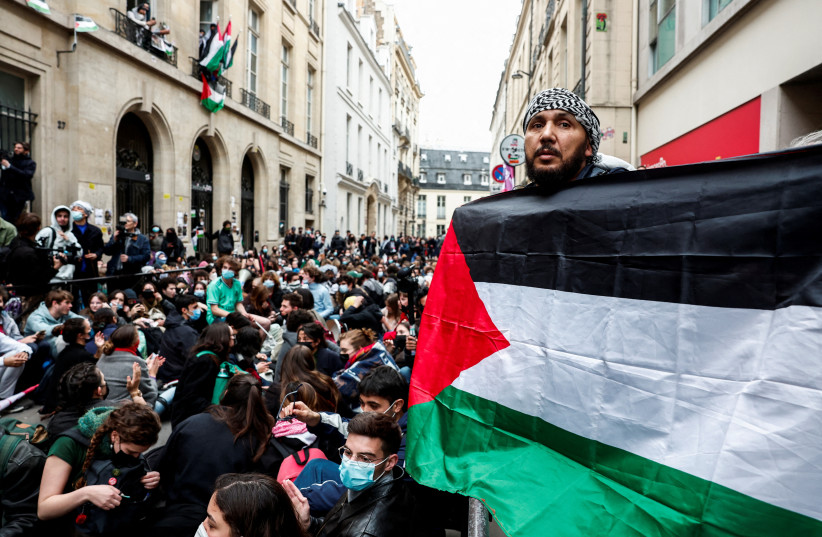Police in Paris entered France's prestigious Sciences Po university on Friday and removed student activists who had occupied its buildings overnight in protest against Israel's conduct in its war against Hamas in Gaza.
A Reuters witness saw police go into the buildings and take out many of the 70-odd pro-Palestinian protesters inside. Unlike on some college campuses across the United States, the French protests have been peaceful and there were no signs of violence as the students were brought out of the buildings.
The university was closed for the day on Friday, with a heavy police presence around its main building after a debate between the institute's leadership and students on the war in Gaza failed to ease tensions, prompting protesters to occupy it overnight.
The elite political sciences university this week became the center of a wave of protests at several schools in France over the war and academic ties with Israel, although not on the same scale as seen in the United States.
A group of around 70 students were occupying Sciences Po's main buildings in central Paris on Friday morning after having spent the night there, Jack, one of the protesters, told Reuters in a text message, adding: "By the way, the negotiations with leadership are making no progress."

Sciences Po did not immediately reply to a request for comment. Local newspaper Le Parisien and Radio France Inter, citing an internal memo, reported the university was asking staff to work from home as university buildings were closed.
Sciences Po's director on Thursday rejected demands by protesters to review the schools' relations with Israeli universities, prompting protesters to continue their movement with at least one person entering a hunger strike, according to a student speaking on behalf of the protesters.
Anti-Israel activity at Sciences Po university
The student protesters at Sciences Po have been among those most vocally anti-Israel on French campuses. In March, Diaspora Minister Amichai Chikli accused pro-Palestinian students at the university of "screening" Jewish students' entry to the school's Émile-Boutmy amphitheater.
Chikli went on to draw parallels between the historical treatment of Jews in Europe and how the present Jewish students were treated.
The French Jewish student union, Union des Etudiants Juifs de France, also reported that Jewish and Zionist students had been blockaded from the hall.
Prime Minister Gabriel Attal's office said student protesters had been evacuated from 23 institutions of higher education around the country on Thursday, adding in a statement: "In contrast to what we see abroad, namely across the Atlantic, no permanent protest camp (...) has been established in France."
"There is a level of anger and bafflement about the situation, about the deafening silence of the institutions on what has been going on (in Gaza) since October," said Clement Petitjean, an American studies professor at Sorbonne University.
"There is a level of anger and dissatisfaction that had been there for a while and (the Gaza war) was the spark that caused this huge fire that right now political elites don't know how to extinguish."
Sciences Po's director Jean Basseres on Thursday rejected demands by protesters to review its relations with Israeli universities, prompting protesters to stand their ground.
Jack, a Sciences Po student who declined to give his surname, said he was one of around 70 students who spent Thursday night occupying one of the university's main buildings in central Paris.
He said protesters had declined an ultimatum by university officials to clear large parts of the building and restrict their movement to a defined smaller area.
A Sciences Po spokesperson said some of the its satellite campuses in Reims, Le Havre and Poitiers were also affected by protests.
Sciences Po Lyon, an unaffiliated university in France's third largest city, was also blocked by protesting students on Friday, as well as the Lille school of journalism, images broadcast by French news channels showed.
Petitjean attributed the smaller scope of the French protests compared to those in the US to factors including a lower degree of economic ties between universities and Israeli entities and less outspoken support from academic staff.
Michael Starr contributed to this report.
